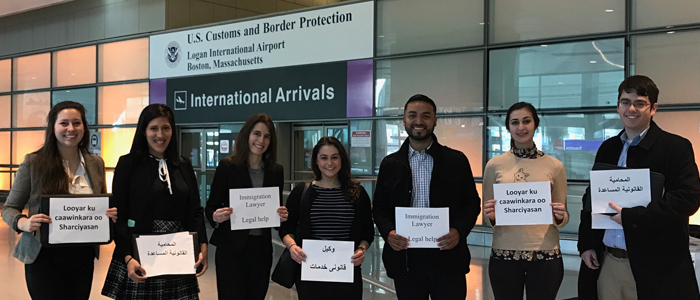BU Law Students Assist Travelers Affected by President’s Executive Orders
Students in the Immigrants’ Rights Clinic recently worked at Logan Airport to educate travelers on their rights.
Students in Boston University School of Law’s Immigrants’ Rights Clinic (IRC) have been working to help those caught in the confusion following President Trump’s executive orders on immigration enforcement and deportation.
Supervised by Clinical Instructor Sarah Sherman-Stokes, IRC students recently worked in conjunction with the American Immigration Lawyers Association and the American Civil Liberties Union (ACLU) to ensure compliance with the Massachusetts Federal Court Order that put a seven-day hold on the enforcement of President Trump’s executive order of January 27, 2017, which blocked travelers coming to the US from seven majority Muslim countries.
Students, on a volunteer-basis, went to Logan Airport and provided legal support for travelers who were having issues or were simply curious about their rights. The Executive Order caused confusion in airports across the country, as it did not account for travelers en route to the US. Individuals with valid student or work Visas and legal permanent residents were detained, prompting protests to spark around the country calling for their release.

Among the group of students who volunteered to go to Logan Airport, Mario Paredes (’18) and Victoria Baratian (’17) gained on-the-ground experience helping travelers with their immigration issues. Paredes says the clinic’s goal is to provide a support role for immigrants concerned about how President Trump’s orders might affect them. The clinic is able to educate individuals who run into trouble at customs about their rights and direct them to the ACLU or other organizations that can provide legal representation in court.
For Paredes, the need for advocacy and community work in law is something he finds as a crucial component to why he chooses to practice law.
“I think right now what we’re seeing is lawyers realizing that being a lawyer is more than just interpreting the law or working within just the confines of the law,” Paredes says. “Lawyers are advocates and I think this advocacy piece is a huge part of being a lawyer.”
Baratian says coming from an immigrant community has made her committed to working in immigration law and representing those in need.
“I’m a first-generation American, so the people who I call family here are all immigrants,” Baratian says. “I know people who are here struggling and working as hard as they can to give their kids a better life and I want to help them.”
Sherman-Stokes says the clinic’s work at Logan is only the beginning of what she sees as a response to the immigration policies of the Trump administration.
“There were people facing deportation before these executive orders, and there will be people facing deportation even after these executive orders are rescinded,” Sherman-Stokes says. “There are still going to be a lot of people in Boston and around the country who are impacted by immigration detention and deportation. The IRC students and I are going to be there to represent those people.”
The IRC is offering events to educate BU Law students and the public about the executive orders and the activities of courts across the country seeking to block enforcement both of the original travel ban and the revised executive order of March 6, 2017. The IRC has held several teach-ins and a free legal clinic open to all BU students, seeking to provide confidential legal consultation to those with questions about their legal status.
Paredes says the clinic has allowed him to delve into current topics and understand the rhetoric of issues that are currently relevant in the policy field.
“Being in real-time mode in looking at the law and seeing how it could affect the future of immigration law has been very useful,” Paredes says. “Whether we go into policy making, community advocacy, or government, I think it will be beneficial to know how to craft these policies, interpret them, and understand the effect they could have on immigrants.”